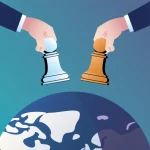Introduction
The year 2025 has become a turning point in global politics. Nations are grappling with economic uncertainty, climate challenges, technological disruptions, and shifting alliances that have reshaped the international order. As traditional powerhouses recalibrate their roles, emerging economies are asserting themselves on the world stage. From renewed geopolitical rivalries to the rise of diplomacy driven by technology, politics in 2025 is more interconnected—and more fragile—than ever before.
- Introduction
- U.S. Politics and Its Global Impact
- China’s Expanding Global Role
- Europe’s Quest for Unity
- The Middle East: A Region in Transition
- Russia and Its Global Posture
- Africa’s Emerging Influence
- Technology and the New Diplomacy
- Climate Politics: A Global Priority
- The Role of Citizens and Social Movements
- FAQs
- Conclusion
This article examines the major global political developments of 2025, the challenges facing world leaders, and how citizens worldwide are being affected.
U.S. Politics and Its Global Impact
The United States remains a dominant force in world affairs, but internal polarization continues to shape its foreign policy. With ongoing debates over immigration, climate policy, and military spending, the U.S. has had to balance domestic priorities with international commitments.
In 2025, Washington has focused heavily on rebuilding alliances, particularly with Europe and Asia, to counterbalance China’s growing influence. At the same time, U.S. tech regulation and AI governance policies are setting global standards, influencing how other nations manage technology.
China’s Expanding Global Role
China in 2025 is no longer just an economic powerhouse—it has become a central political player. Its Belt and Road Initiative has expanded deeper into Africa, Latin America, and Europe, giving Beijing significant leverage over infrastructure and trade networks.
Politically, China’s assertive stance in the South China Sea and its growing partnerships with countries in the Middle East and Africa have intensified competition with the West. However, China also faces internal pressures, including demographic shifts and economic slowdowns, which complicate its global ambitions.
Europe’s Quest for Unity
Europe in 2025 faces the challenge of staying united amid rising nationalism and economic strains. The European Union has strengthened its focus on energy independence, spurred by past geopolitical conflicts, and is now leading in renewable energy policies.
Politically, Europe is balancing its relationship with both the U.S. and China while trying to expand its influence in Africa and the Middle East. Yet, debates over migration, defense spending, and digital governance continue to test the cohesion of the European bloc.
The Middle East: A Region in Transition
The Middle East remains a critical center of global politics, influenced by oil, energy transitions, and shifting alliances. Several nations are diversifying their economies beyond fossil fuels, with Saudi Arabia and the UAE leading investments in technology and tourism.
Political reform efforts are slowly reshaping governance structures, though tensions remain high in conflict zones such as Yemen and Syria. Diplomatic relations between Israel and Arab states continue to evolve, but peace remains fragile in the region.
Russia and Its Global Posture
In 2025, Russia remains a key player in energy and military affairs but faces economic isolation due to sanctions. Despite challenges, Moscow continues to exert influence in Eastern Europe, Central Asia, and the Arctic. Its pivot toward Asia, especially stronger ties with China and India, signals a new alignment that challenges Western dominance.
Domestically, Russia is focused on managing economic pressures and maintaining political stability, but its assertive foreign policy continues to draw global attention.
Africa’s Emerging Influence
Africa has become a critical player in 2025, thanks to its youthful population, growing economies, and technological adoption. Nations like Nigeria, Kenya, and South Africa are pushing for greater representation in global institutions.
Politically, African leaders are negotiating trade agreements that give them more leverage in international markets. However, the continent still faces challenges with governance, climate change, and security threats. Despite these hurdles, Africa’s voice in global politics is stronger than ever before.
Technology and the New Diplomacy
One of the most striking developments in 2025 is the rise of technology-driven diplomacy. Virtual summits, AI-assisted negotiations, and digital treaties have become common practice. Nations are competing not just for territory or resources, but for dominance in cyberspace, artificial intelligence, and biotechnology.
Cybersecurity has become a top priority, with governments forming alliances to combat digital warfare. At the same time, AI is being used in policy simulations to forecast the impact of political decisions, raising both hopes and concerns about the future of governance.
Climate Politics: A Global Priority
Climate change continues to dominate global political discourse. Extreme weather events in 2024 forced many governments to adopt stricter climate policies in 2025. International agreements are being enforced more aggressively, with penalties for non-compliance.
Nations are now competing to lead in renewable energy technologies, and climate-focused diplomacy has become as important as trade or security negotiations. Yet, disputes over funding for developing countries remain unresolved, making climate justice a central political issue.
The Role of Citizens and Social Movements
Global politics in 2025 is not only shaped by governments but also by citizens and grassroots movements. From climate activists to digital rights groups, people around the world are demanding accountability and transparency from leaders.
Social media remains a double-edged sword—fueling civic engagement but also spreading disinformation. Citizens are more empowered than ever, but they are also more vulnerable to manipulation in the digital age.
FAQs
Which countries dominate global politics in 2025?
The U.S., China, and the European Union remain dominant, but Africa, India, and the Middle East are gaining greater influence.
How is technology affecting global politics?
Technology is transforming diplomacy, cybersecurity, and governance, with AI and digital platforms playing central roles in international relations.
What role does climate change play in politics now?
Climate change is at the heart of global policy-making, with nations competing in renewable energy and climate-focused diplomacy.
Is global conflict increasing or decreasing in 2025?
Conflicts persist in certain regions, but diplomacy, alliances, and economic cooperation are preventing escalation into larger wars.
How are citizens influencing politics today?
Grassroots movements, social media activism, and digital advocacy campaigns are giving citizens greater influence over political agendas.
Conclusion
Global politics in 2025 is a story of shifting alliances, emerging powers, and growing challenges. While old rivalries persist, new dynamics—fueled by technology, climate concerns, and grassroots activism—are reshaping how nations interact.
The balance of power is more complex than ever, with no single nation able to dominate the global stage. For readers of Dusktimes.com, understanding these trends is essential, as the decisions made in capitals around the world today will determine the political, economic, and environmental landscape of tomorrow.






